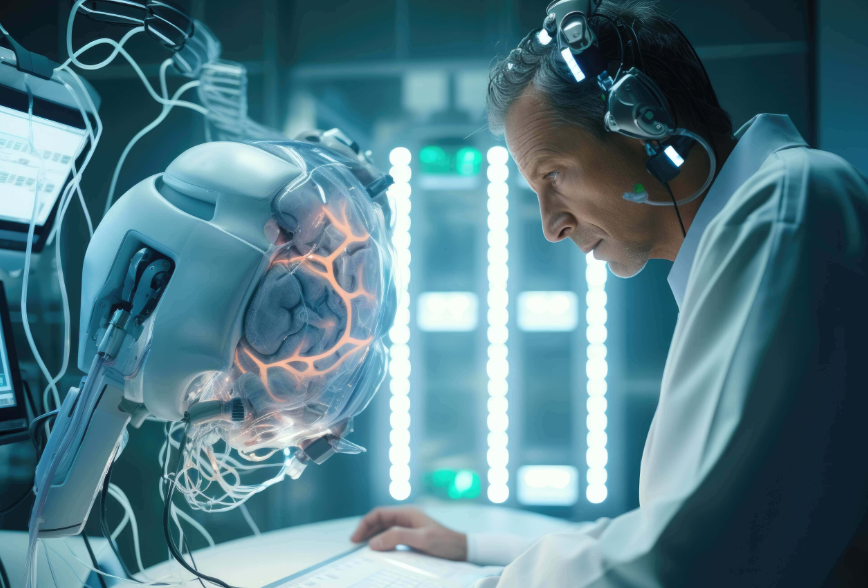The integration of artificial intelligence (AI) into healthcare is not just a trend—it’s a transformative shift that promises to revolutionize the way medical professionals diagnose, treat, and manage patient care. AI-powered healthcare solutions are paving the way for more accurate diagnoses, personalized treatments, efficient healthcare delivery, and improved patient outcomes. From predictive analytics to robotic surgeries, AI is redefining the healthcare landscape, making it more proactive, precise, and accessible.
What is AI in Healthcare?
AI in healthcare refers to the use of machine learning, deep learning, and other forms of artificial intelligence to analyze vast amounts of medical data, provide insights, and even assist in decision-making. By training algorithms on historical health data, AI systems can recognize patterns, predict outcomes, and offer treatment recommendations. These technologies can be applied across various aspects of healthcare, from clinical decision support to patient monitoring and medical imaging.
Key AI-Powered Healthcare Solutions
- Predictive Analytics and Early Diagnosis
One of the most promising applications of AI in healthcare is predictive analytics. By analyzing patient data such as medical history, lab results, and lifestyle factors, AI can predict potential health risks and outcomes. This allows healthcare providers to detect conditions early, even before symptoms appear. For instance, AI algorithms have shown great promise in identifying early signs of diseases like cancer, heart disease, and diabetes, enabling doctors to intervene earlier and improve survival rates.- Example: IBM’s Watson Health is an AI system that analyzes medical literature and patient records to provide evidence-based treatment recommendations. It has been used to detect early-stage cancers and assist oncologists in designing personalized treatment plans.
- Medical Imaging and Diagnostics
AI is revolutionizing medical imaging by enabling faster and more accurate interpretation of medical images, such as X-rays, CT scans, and MRIs. AI algorithms can detect anomalies like tumors, fractures, and other medical conditions that may be missed by the human eye. These systems can assist radiologists by automating the analysis of images, leading to quicker diagnoses and more precise results.- Example: Google Health developed an AI system that outperformed radiologists in detecting breast cancer from mammograms. The system can reduce false positives and false negatives, significantly improving diagnostic accuracy.
- Personalized Medicine
AI is making strides in tailoring medical treatments to individual patients, a concept known as personalized or precision medicine. By analyzing data from various sources—genetic information, lifestyle choices, and environmental factors—AI can help healthcare providers develop personalized treatment plans that are more likely to be effective for each patient.- Example: AI models can help oncologists select the most effective chemotherapy drugs based on a patient’s genetic makeup, increasing the likelihood of a positive response while minimizing side effects.
- Robotic Surgery
Robotic surgery systems powered by AI offer increased precision, flexibility, and control during surgical procedures. These systems, often guided by AI algorithms, can perform minimally invasive surgeries with greater accuracy, reducing the risk of complications and shortening recovery times. Surgeons can use robotic systems to execute delicate tasks with high precision, even in areas that are difficult to access.- Example: The Da Vinci Surgical System is an advanced robotic platform that enables surgeons to perform minimally invasive surgeries with enhanced precision. The system’s AI-assisted tools provide real-time feedback, improving surgical outcomes.
- Virtual Health Assistants
AI-powered virtual assistants are becoming a common tool in healthcare settings, helping patients and healthcare providers manage care more efficiently. These virtual assistants can answer questions, schedule appointments, send medication reminders, and even provide mental health support through conversational AI. Virtual assistants make healthcare more accessible by enabling patients to receive advice and assistance outside of regular office hours.- Example: “Ada Health” is an AI-powered symptom checker that helps patients understand potential causes of their symptoms and provides recommendations for next steps. It leverages machine learning to give personalized advice based on the user’s health data.
- Drug Discovery and Development
AI is accelerating the drug discovery process by analyzing vast amounts of biological, chemical, and clinical data to identify promising drug candidates. Traditional drug discovery can take years, but AI systems can predict the efficacy and safety of drugs in a fraction of the time, potentially bringing new medications to market faster and at a lower cost.- Example: Insilico Medicine, an AI-driven biotech company, used AI algorithms to identify a potential drug for fibrosis in just 46 days. AI models can simulate the effects of thousands of molecules and suggest the most promising candidates for further development.
- Healthcare Chatbots for Patient Interaction
AI-powered chatbots are being employed to handle routine patient inquiries, provide health information, and even manage administrative tasks such as scheduling appointments and billing. These chatbots can assist patients 24/7, providing immediate responses to non-urgent concerns and alleviating the workload of healthcare staff.- Example: Babylon Health’s AI chatbot offers a wide range of healthcare services, including symptom checking and advice on treatment. The system uses natural language processing (NLP) to engage with patients in a conversational manner, providing accurate information quickly.
- Remote Patient Monitoring and Telemedicine
Remote patient monitoring (RPM) systems powered by AI allow healthcare providers to track a patient’s health data in real-time, even when they are at home. Wearables and mobile apps collect data on vital signs like heart rate, blood pressure, glucose levels, and more. AI algorithms can analyze this data to detect anomalies and alert healthcare providers when intervention is needed, enabling more proactive care.- Example: Devices like Apple Watch and Fitbit use AI to monitor heart rhythms, steps, and sleep patterns. These systems can alert users to potential health issues, such as irregular heartbeats, that require medical attention.
See also: Robotics: Redefining Automation
Benefits of AI in Healthcare
- Improved Diagnostic Accuracy
AI can analyze medical data with precision and speed, leading to more accurate diagnoses. AI-driven tools can identify patterns that may be overlooked by human practitioners, improving diagnostic accuracy and reducing errors. - Increased Efficiency
AI reduces the time required for administrative tasks and routine diagnostics, allowing healthcare professionals to focus on more complex patient care. It streamlines workflows, enhances the speed of diagnosis, and shortens treatment times. - Cost Reduction
By improving efficiency, reducing human errors, and accelerating drug discovery, AI can help lower healthcare costs. AI solutions can automate repetitive tasks, reduce unnecessary procedures, and optimize treatment plans, all of which can help reduce costs for both healthcare providers and patients. - Better Patient Outcomes
With more accurate diagnoses, personalized treatment plans, and continuous monitoring, AI-powered healthcare solutions contribute to better patient outcomes. AI enables proactive care, which can lead to the early detection of diseases and improved long-term health outcomes. - Access to Healthcare
AI solutions like virtual assistants and telemedicine expand access to healthcare, especially in underserved or remote areas. Patients can receive medical advice and care without needing to visit a healthcare facility, overcoming barriers such as geographic location or lack of available specialists.
Challenges and Ethical Considerations
While AI holds immense potential, its adoption in healthcare comes with challenges and ethical considerations:
- Data Privacy and Security
Healthcare data is highly sensitive, and the use of AI requires stringent measures to protect patient privacy. Ensuring that AI systems comply with data protection laws, such as HIPAA in the U.S. or GDPR in Europe, is critical for maintaining trust in these technologies. - Bias in AI Models
AI systems can inherit biases from the data they are trained on, leading to biased outcomes. If the data used to train AI models is not diverse, it can result in inaccurate diagnoses or treatments for certain populations. Ensuring fairness and diversity in AI training datasets is essential to avoid these issues. - Regulation and Oversight
The rapid development of AI technologies in healthcare necessitates robust regulatory frameworks to ensure safety, efficacy, and transparency. Healthcare regulators must keep up with AI advancements to ensure that new technologies are safe for patient use. - Integration with Existing Systems
Many healthcare systems have legacy infrastructure, which can pose challenges when integrating AI solutions. Seamless integration of AI technologies with existing electronic health records (EHR) and other healthcare systems is essential for maximizing their impact.
Conclusion
AI-powered healthcare solutions are poised to revolutionize the industry, offering the potential to improve diagnosis, treatment, patient care, and healthcare delivery. While there are challenges to overcome, such as data privacy concerns and algorithmic biases, the benefits of AI in healthcare—ranging from increased efficiency and cost reduction to better patient outcomes—are undeniable. As AI technologies continue to evolve, their role in healthcare will become increasingly vital, shaping a future where healthcare is more personalized, accessible, and effective.



